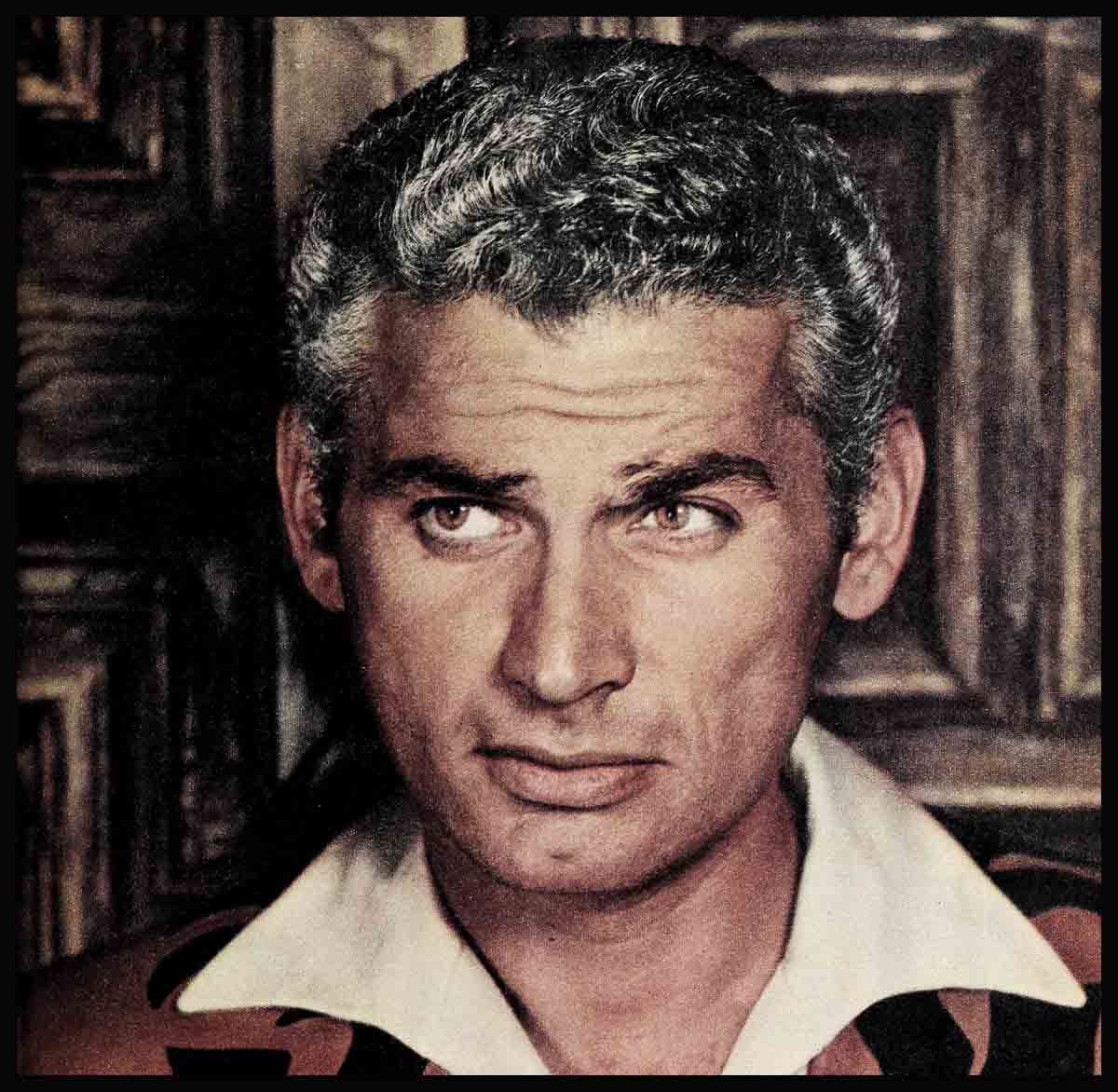
Sentiment Rebel—Jeff Chandler
Jeff Chandler is a rebel, not an obvious rebel like Marlon Brando or Monty Clift or that new and very talented wild man Jimmy Dean. Not for Chandler the sloppy shirt, the uncombed hair or a noisy motorcycle. His rebellion is quieter.
For example, take his living in his studio dressing room. It’s a big luxurious dressing room. But for a man with his income and position it seems as ridiculous for him to live there as it would be for the head of a great corporation to sleep in his office. That is, until you examine the situation more closely.
Living at the studio, Jeff is completely safe from the lenses of prowling cameramen, the ears of listening columnists. He’s no hermit. But as nearly as he can manage it, he means to have romance on his own terms—which are not the terms of hitting the headlines, or of being openly pursued, as many a glamour girl has found out to her annoyance. “I can do my own hunting,” is the way Jeff sums up that little familiar Hollywood situation.
Jeff’s always done his own summing up. Born Ira Grossel in Brooklyn, New York, some thirty-odd years ago, from the beginning Jeff had an almost violent individualism, which neither fame, fortune nor matrimonial disaster have been able to tame. While in high school, he made up his mind he was going to act. Since he had to help out in his mother’s candy store after school, he couldn’t take part in any of the school dramas. But upon graduating, he set out to earn the $500 he needed for enrollment in dramatic school. It was a long struggle, and one day Jeff thought he’d found an easy way to earn it.
For $200 he could study commercial art, and from the money he’d earn as an artist, he could increase his weekly savings. He went off to art school; completed his course; started to work as a free-lance artist and within months was back at school—this time as an instructor.
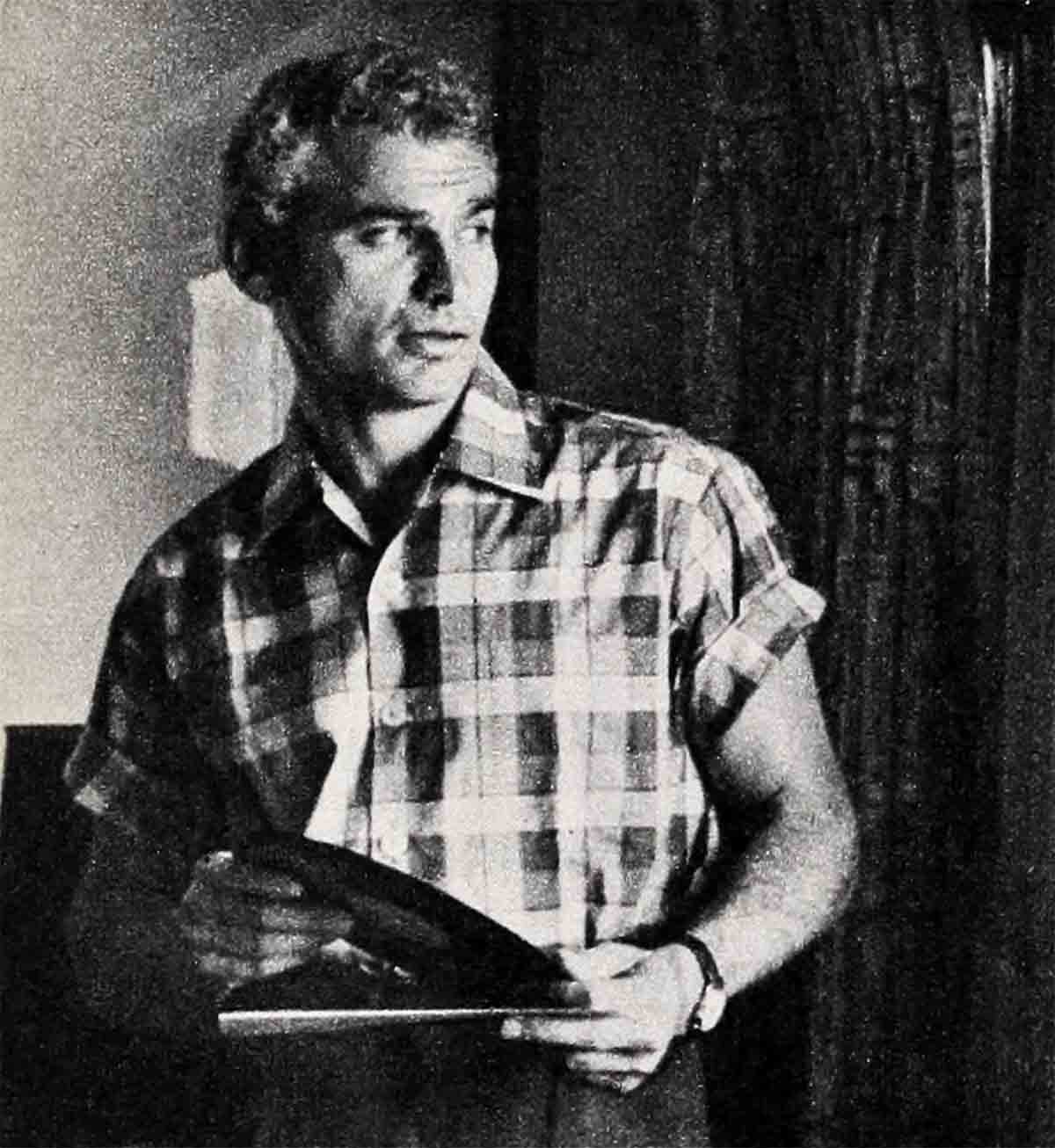
It was through one of his art pupils, who was also studying drama at Feagin School of Dramatic Arts in New York, that Jeff was invited to one of the student plays. So impressed was he that evening that he got up early the next morning and was the first to arrive at Feagin’s drama school. He had something to ask. Could he have a scholarship? He got it! After drama school and a stint in a Long Island stock company, Jeff and actor-friend Bill Bryan started their own stock company in Elgin, Illinois. Although the company was a success, Jeff gave it all up to enlist in the Army after Pearl Harbor. Four years and a long spell in the Aleutians later, Jeff turned up in Hollywood, within days of shedding his first-lieutenant’s uniform for civilian togs. Army discharge pay kept him eating until he landed the lead, on radio, of Mr. Dana and Michael Shayne, Detective. His big break came after he won the role of Eve Arden’s boy friend on “Our Miss Brooks,” and not too long after was signed for “Sword in the Desert.” Since then, Jeff’s career has in no way faltered in its steady climb to the top. Today, Jeff’s only gripes are personal ones.
For instance, he actually wishes he weren’t so distinctive-looking, so that he could go around more openly with the ladies of his choice. Or, at least, so he says. He claims his face has always been a difficulty to him. “It’s put together like a hound dog’s,” he says, “making me look unhappy regardless of how I feel. Often I’m sitting alone somewhere and as close a friend as Tony Curtis will come up to me and say, ‘What’s the matter, Jeff?’ Nothing is the matter. It’s just my face, but people never believe that.”
On the other hand, a brand-new white Cadillac and suits that no self-respecting tailor could possibly turn out under $250 put on such a body as Jeff’s would give him a high visibility anywhere. But he never seems to think of this, any more than he seems to realize he’s being unusual in resenting his name being coupled with certain of his dates’. This resentment is not on their account or his own, but because such rumors “hurt Marje.”
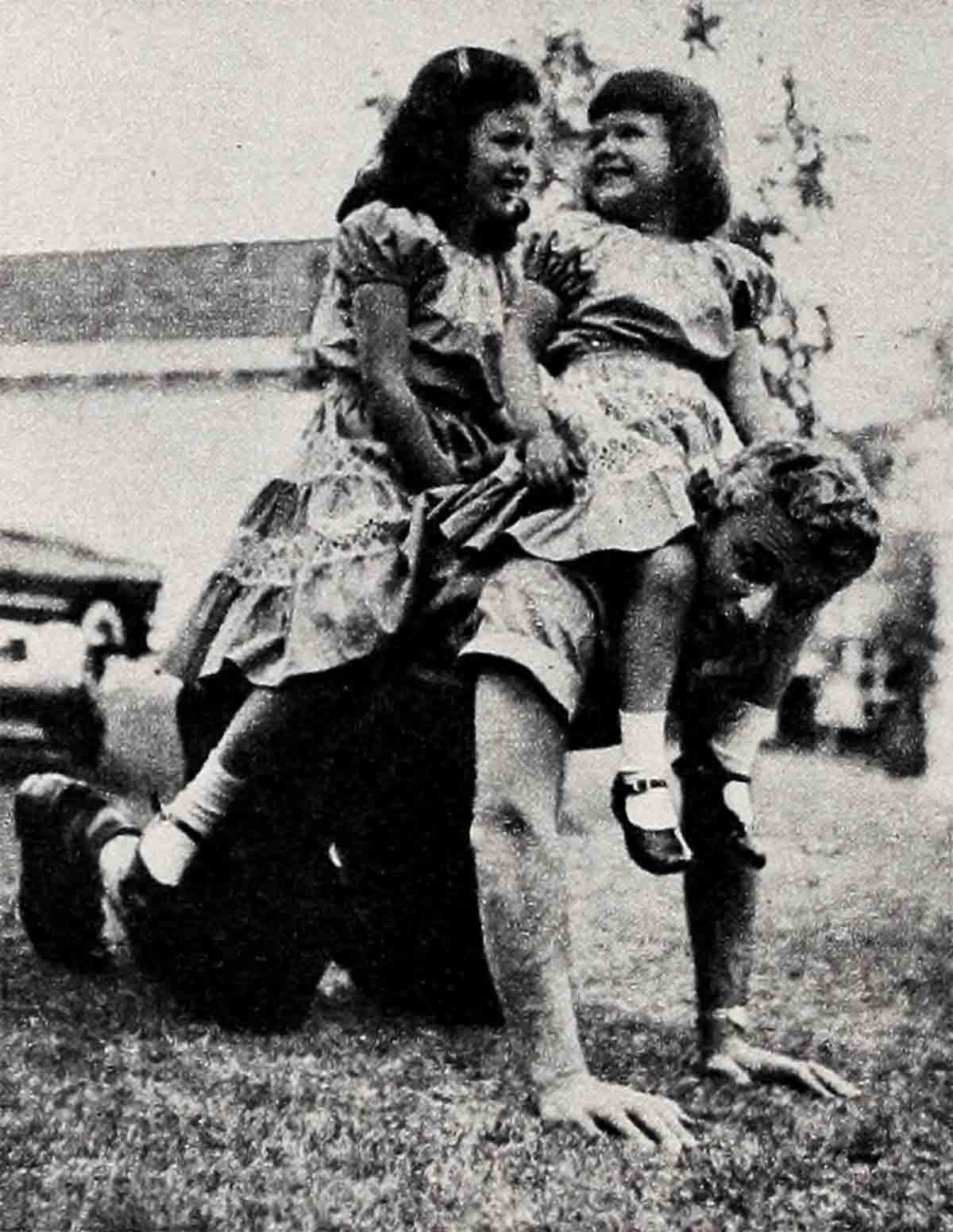
Marje is, of course, his ex-wife. She and Jeff were divorced a year ago after eight years that were so stormy that they had one serious parting and a reconciliation before their final separation. She has the custody of their two daughters: Jamie, who is now eight, and Dana, about to be six.
Jeff, a devoted father, calls them daily. He always talks to Marje, too. He visits them once a week, on Sunday. At the time of the divorce, he had “reasonable visitation rights,” which he interpreted to mean he could drop in anytime. But he soon found that was disturbing all of them. So now he spends all day Sunday with them, and it bothers him that he can’t take his girls on pony rides or to the various amusements spots around Los Angeles because when he does fans stampede him and he has to spend all his time signing autographs.
It worries him, too, that he has made his children the product of divorce. “I think that is the chief reason my own marriage went wrong,” he says. “I came from divorced parents. So did Marje. That’s a bad background for lasting love. I’m sorry Jamie and Dana are inheriting it.”
Yet, individualistic rebel that he is, he has his freedom. He won’t say whether it was he who most wanted the divorce or his wife. He insists that they both wanted it. But if that’s true, then why does Marje care what he does? And why does he care if she does care?
He is naturally sentimental, though perhaps not aware of it. At a party about four years ago, Tony Curtis came rushing in, wearing the first tuxedo he had ever owned. Of course, Tony had worn tux in a picture or two, but this midnight blue number had been made to order for him and paid for with his own money.
Most young men, Jeff included, would have gone around pretending a new dinner jacket was a mere commonplace to them. But not the bounding Tony. He had to have everybody look at it, feel it, know the price of it. Watching him, Jeff murmured, “If anybody ever hurts that kid, takes that natural warmth away from him, I’ll kill him myself.” Of course Jeff is kidding, but his words imply a feeling which he has toward those who are of special importance to him.
“For instance, I’d hate to have any friend of mine, and I consider Tony a very good friend, find out what it is like to live alone.”

Yet Jeff lives alone at the studio which at night couldn’t be lonelier or spookier. But what he has for himself, the kind of life he leads means that he appreciates, all the more, what he would wish for those to whom he gives affection. The very personality traits Tony has, Jeff does not possess. He is fonder of Tony and admires him more than he does any other person—perhaps because he has none of Tony’s easy outward-going warmth, none of his simple love of people.
But with all this admiration for well-rounded social life, when Jeff decided to get a house a few months back, he got it in Apple Valley, about one hundred miles from Hollywood and his friends.
But Apple Valley is no Palm Springs, which is made up in equal parts of actors, writers, song pluggers and rich tourists. What’s more, Palm Springs is within reasonably easy commuting distance from Hollywood. There is a real movie-colony aristocracy there. It’s rich with the kind of talk you’d think Jeff would prefer, particularly now that he is getting more and more into music recording, and when he also wants to branch out into directing and producing as well as acting.
There’s nobody like him in Apple Valley. What’s more, the place is so distant from U-I that Jeff can seldom get there. To top it all, he just rents the house.
And a further part of his mysterious pattern is that he actually does have a Hollywood apartment. Virtually nobody has ever been in it, including Jeff. Yet he keeps it—“to be alone with myself.”
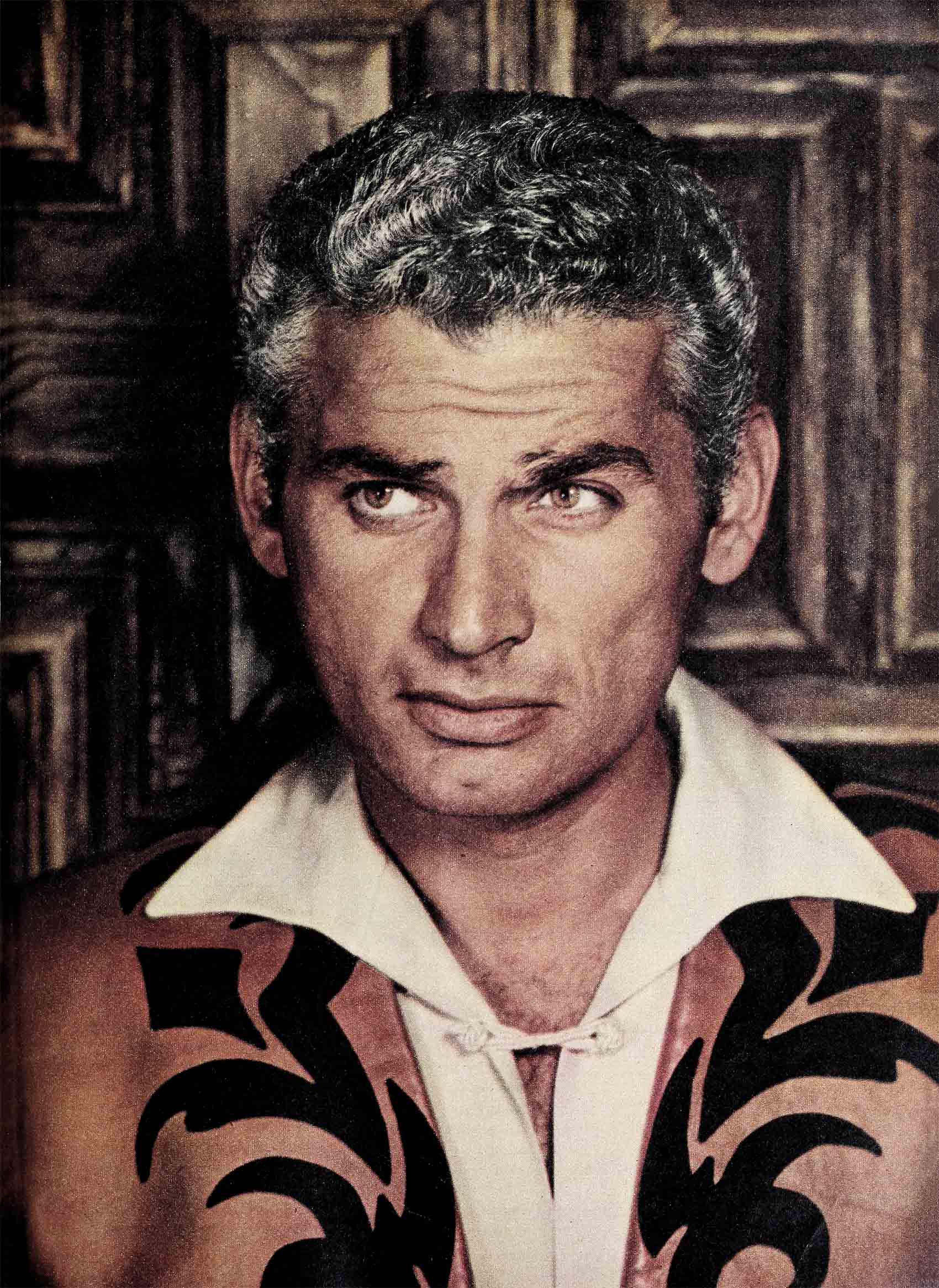
Try to pin him down on that, ask him why he doesn’t settle on one big house or apartment or something and he says, “My needs are very small.” Then in the next breath he’s telling how back in his childhood he promised himself that one day he’d be making $5,000 a week, and that he is almost at that goal right now. He’ll also confess that he began acting, not from any artistic urge, but because it was “the fastest way to make a buck” that he knew about. Then he reverses gears and says he wants to become a director because he can’t get enough self-expression from acting.
Along with his singing and lyric writing, from which he is getting a big charge (and a lot of income) he’s now branching out into writing, both for movies and radio. And being very good at that, too.
Which doesn’t give him too much time in which to date Betty Abbott, who used to go with Rock Hudson. Is Jeff serious about Betty, whom he calls “a real nice girl,” more serious than he was about Gloria DeHaven not so long ago, or Ann Sheridan once upon a time? Maybe Jeff will remarry. He says that he wants to, just as he says he does hope to fall in love again. But none of the girls he dates resemble one another and whenever his name is coupled with a particular girl he scowls angrily “because of Marje.”
It all proves he’s sensitive to other peoples’ emotions, even while apparently he doesn’t want to conform too much to them himself.
And all the various mediums of expression he is now indulging, like his singing, acting and writing, prove how much creative drive he has, which is one of the reasons he is so appealing on-screen.
If and when the girl comes along who can turn him from being an “aloner” into being a happy husband, then you’ll really see something. But even as he is right now, you have to admit—Jeff’s pretty doggoned wonderful!
THE END
It is a quote. PHOTOPLAY MAGAZINE APRIL 1955


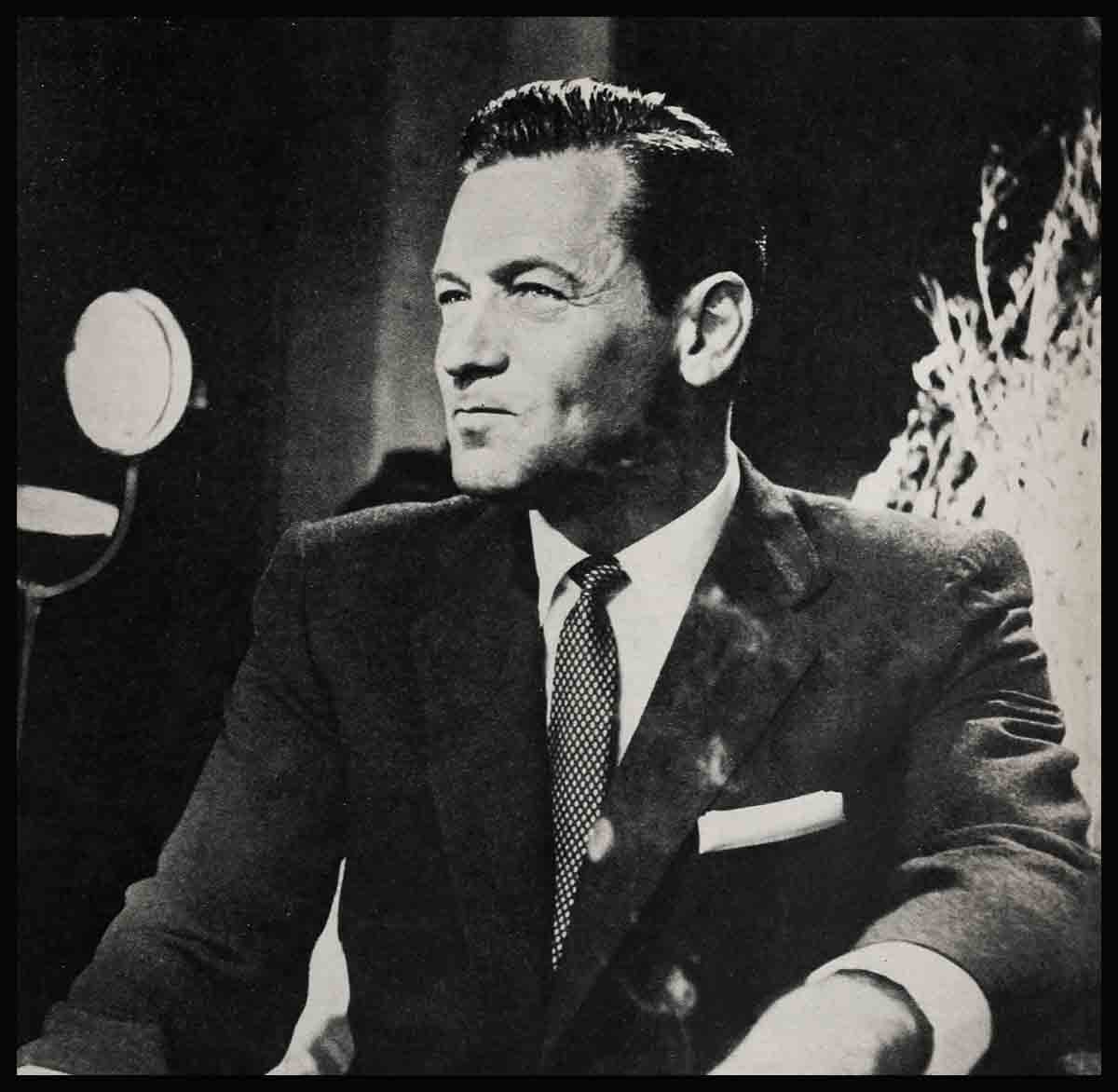

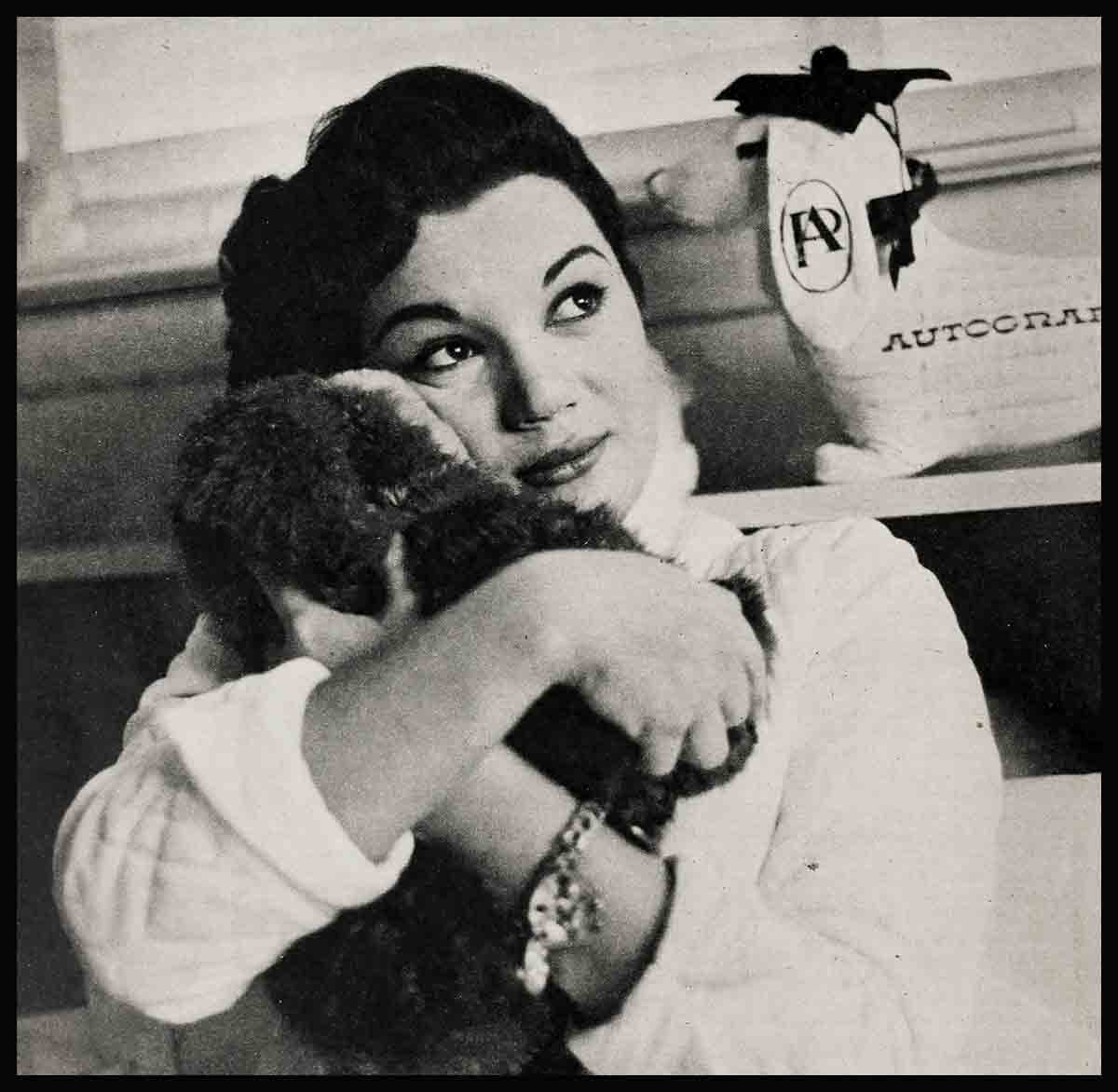
zoritoler imol
2 Ağustos 2023You are my intake, I possess few web logs and infrequently run out from to brand.